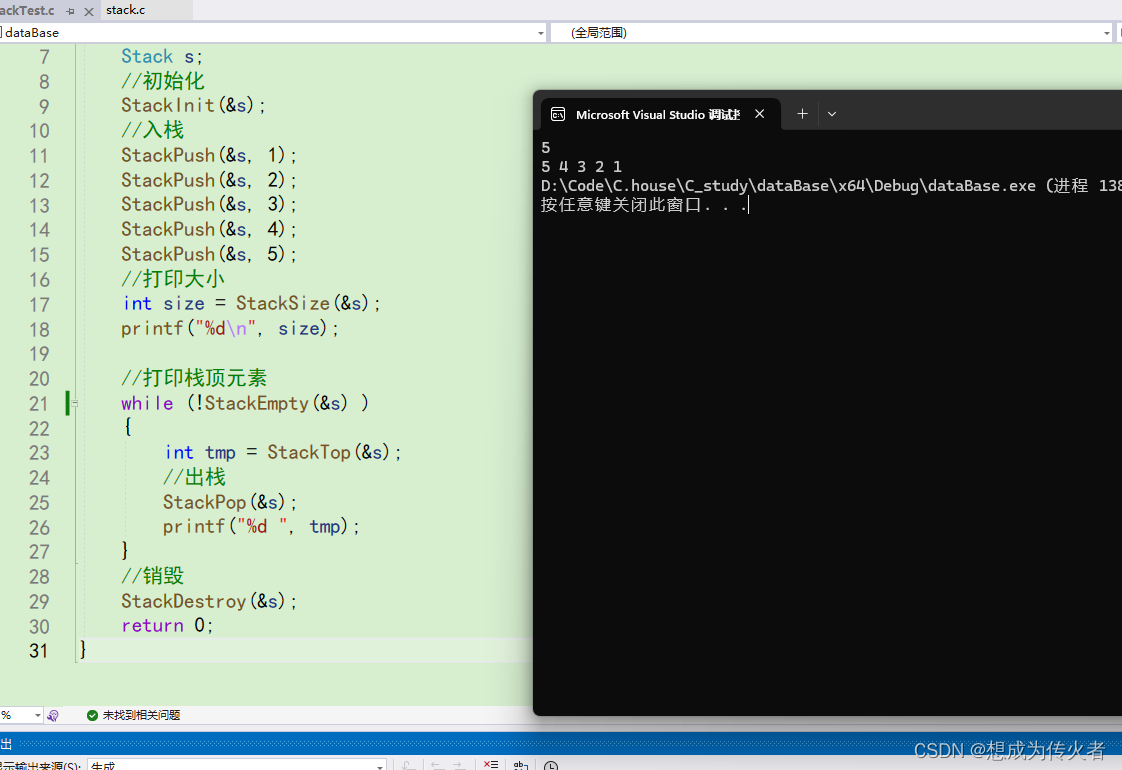stack.h
#pragma once
#include <stdio.h>
#include <stdlib.h>
#include <assert.h>
#include <stdbool.h>
// 支持动态增长的栈
typedef int STDataType;
typedef struct Stack
{
STDataType* a;
int top; // 栈顶
int capacity; // 容量
}Stack;
// 初始化栈
void StackInit(Stack* ps);
// 入栈
void StackPush(Stack* ps, STDataType data);
// 出栈
void StackPop(Stack* ps);
// 获取栈顶元素
STDataType StackTop(Stack* ps);
// 获取栈中有效元素个数
int StackSize(Stack* ps);
// 检测栈是否为空
bool StackEmpty(Stack* ps);
// 销毁栈
void StackDestroy(Stack* ps);
stack.c
#include "stack.h"
// 初始化栈
void StackInit(Stack* ps)
{
assert(ps);
ps->a = NULL;
ps->top = 0;
ps->capacity = 0;
}
// 入栈
void StackPush(Stack* ps, STDataType data)
{
assert(ps);
if (ps->top == ps->capacity)
{
int newCapacity = ps->capacity == 0 ? 4 : ps->capacity * 2;
Stack* tmp = (Stack*)realloc(ps->a, sizeof(STDataType) * newCapacity);
if (tmp == NULL)
{
perror("StackPush");
exit(-1);
}
ps->a = tmp;
ps->capacity = newCapacity;
}
ps->a[ps->top++] = data;
}
// 出栈
void StackPop(Stack* ps)
{
assert(ps);
assert(ps->top > 0);
ps->top--;
}
// 获取栈顶元素
STDataType StackTop(Stack* ps)
{
assert(ps);
return ps->a[ps->top - 1];
}
// 获取栈中有效元素个数
int StackSize(Stack* ps)
{
assert(ps);
return ps->top;
}
// 检测栈是否为空
bool StackEmpty(Stack* ps)
{
assert(ps);
if (ps->top)
{
return false;
}
return true;
}
// 销毁栈
void StackDestroy(Stack* ps)
{
assert(ps);
free(ps->a);
ps->a = NULL;
ps->top = 0;
ps->capacity = 0;
}
stackTest.c
#include "stack.h"
int main()
{
Stack s;
//初始化
StackInit(&s);
//入栈
StackPush(&s, 1);
StackPush(&s, 2);
StackPush(&s, 3);
StackPush(&s, 4);
StackPush(&s, 5);
//打印大小
int size = StackSize(&s);
printf("%d\n", size);
//打印栈顶元素
while (!StackEmpty(&s) )
{
int tmp = StackTop(&s);
//出栈
StackPop(&s);
printf("%d ", tmp);
}
//销毁
StackDestroy(&s);
return 0;
}
测试示例

